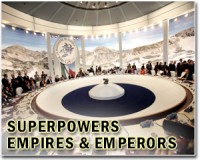| . |  |
. |
Tokyo (AFP) Sept 16, 2009 A week ahead of his debut on the world stage, Japan's new Prime Minister Yukio Hatoyama said Wednesday he wants to build a "relationship of trust" but also frankness with US President Barack Obama. Hatoyama is set to meet Obama, China's president Hu Jintao and other world leaders at the UN General Assembly and climate change talks in New York, and a Group of 20 summit in Pittsburgh on reviving the world economy. Speaking in his first press conference in office, the centre-left leader said that while his government values the traditional US alliance, it will take a less subservient stance than the ousted Liberal Democratic Party. "Japan up until now has been receptive to the United States, but I want to build a relationship in which Japan can act more proactively and tell them our opinions frankly," the Stanford-trained engineering scholar said. On the sidelines of the global gatherings, Hatoyama is arranging his first face-to-face meeting with Obama, where he will have to balance the demands of Japan's traditional US ally with that of his supporters at home. Left-leaning members of the Democratic Party of Japan (DPJ) and coalition partners have strongly pushed for a reduction of the 47,000-strong US troop presence in Japan. The DPJ has also long argued that Japan should not be part of "American wars" and has said it will end a Japanese naval refuelling mission in the Indian Ocean in support of US-led forces in Afghanistan. "We have a variety of pending issues between Japan the United States, namely those on national security, but it is important to take time to review them comprehensively," Hatoyama said Wednesday. Takehiko Yamamoto, political professor at Waseda University in Tokyo, said Hatoyama "may have to walk a tightrope by maintaining both the alliance overseas and a political power balance at home." Hatoyama in a recent essay criticised the excesses of US-style capitalism and globalisation, causing some concern in Washington. In contrast to his business-friendly predecessor, Hatoyama has said free markets alone cannot solve the world's economic problems, calling for a balance between regulation and free-wheeling capitalism. His views earned praise from EU Commission chief Jose Manuel Barroso, who this week hailed the comments as a sign of "converging views" between Brussels and Tokyo. Barroso also welcomed Hatoyama's strong stance on climate change. At the UN assembly, Hatoyama plans to promote Japan's ambitious pledge to cut its greenhouse gas emissions by 25 percent from 1990 levels by 2020, and to help poor countries combat climate change. "Japan is in a good position to take the initiative in negotiations on global warming," said Shinichi Nishikawa, political science professor at Meiji University in Tokyo. "Speaking at the United Nations will be seen as an international pledge" ahead of a UN climate meeting in Copenhagen in December, he said. The trio of meetings "is a golden chance for the Hatoyama administration to promote its policies as the world is watching Japan, which has recently fallen behind China," said Susumu Kato, chief economist at Calyon Securities. Hatoyama, days after his August 30 election victory, said: "It's been said that Japanese diplomacy is quite weak in multilateral talks. We want to contribute to Japan's national interest and to world prosperity." Hatoyama, who has vowed to reach out to Asia, is separately arranging his first meeting with China's Hu, who is also due to attend the UN assembly. In Beijing, vice foreign minister He Yafei said Tuesday both countries were finalising a meeting, adding that "Japan is an important neighbour of China's and our bilateral relationship is very important to both of us." When he meets Hu, and at a planned UN address, Hatoyama is likely to push his vision of a future EU-style East Asian community and single currency. Hatoyama, seeking to ease distrust in Asia stirred by wartime memories, has proposed to build a new state memorial to serve as an alternative focus to the controversial Yasukuni Shrine often seen as a symbol of Japan's militarism.
Share This Article With Planet Earth
Related Links Learn about the Superpowers of the 21st Century at SpaceWar.com Learn about nuclear weapons doctrine and defense at SpaceWar.com
 Crisis-weakened US embraces 'mini-lateralism': study
Crisis-weakened US embraces 'mini-lateralism': studyLondon (AFP) Sept 15, 2009 The United States was dealt a major blow by the world financial crisis but can maintain its global influence if it works more cooperatively with other countries, a British study said Tuesday. The International Institute for Strategic Studies (IISS) said President Barack Obama is already pursuing a strategy of "mini-lateralism" -- in contrast to the perceived unilateralism of his predecessor ... read more |
|
| The content herein, unless otherwise known to be public domain, are Copyright 1995-2009 - SpaceDaily. AFP and UPI Wire Stories are copyright Agence France-Presse and United Press International. ESA Portal Reports are copyright European Space Agency. All NASA sourced material is public domain. Additional copyrights may apply in whole or part to other bona fide parties. Advertising does not imply endorsement,agreement or approval of any opinions, statements or information provided by SpaceDaily on any Web page published or hosted by SpaceDaily. Privacy Statement |